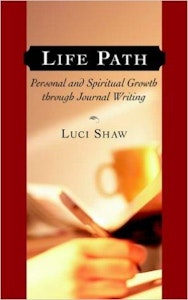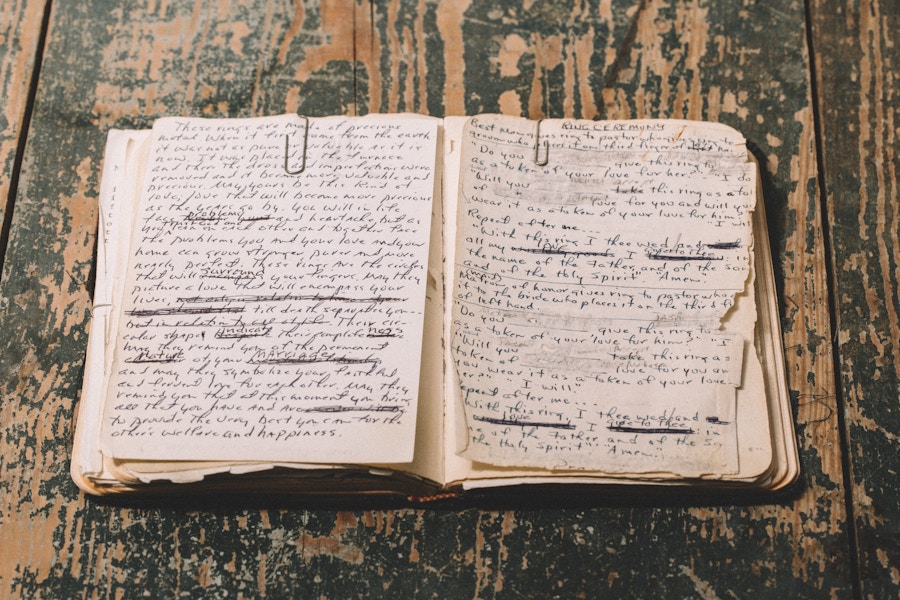Introductory Note:
Poet and teacher Luci Shaw assures us that faithfully keeping a journal—of prayers, reflections, thoughts, etc.—will “enrich, nourish, mature, heal, develop, broaden, enhance and transform” us.
Jan Johnson once wrote, “As we put our feelings and experiences into concrete words, we create an opportunity for God to speak to us.” Even when we are not writers by trade or inclination, there is much value in the spiritual practice of keeping a journal. May it be a blessing in your own walk.
Renovaré Team
 Excerpt from Life Path
Excerpt from Life Path
All kinds of words could be used to describe what keeping a reflective journal will do for the one who writes it; writing a journal regularly will enrich, nourish, mature, heal, develop, broaden, enhance and transform you. No doubt about it, if you become a consistent journal keeper, you will change and be changed.
I could list numbers of well-known journal writers and the titles of their published journals to demonstrate this, among them Augustine’s Confessions, The Diary of a Young Girl by Anne Frank, The Journals of Lewis and Clark, The Life and Diary of David Brainerd, Blaise Pascal’s Pensées, Anne Morrow Lindburgh’s series of published journals, and many others. But maybe two case-histories will serve as examples.
Sharon Earl, a young married woman who spent a week with me in a journal workshop, wrote to me:
The first assignment you gave us, “to write, concretely and honestly, about a relationship,” had an enormous impact on me. I decided to write about my sister who died in May. I felt I had dealt with my grief and did not feel particularly emotional as I began to write. I ended up writing my memories of her since her birth (she was four years younger than I).
As I journaled (and journeyed) through her life, I was shocked at the well of grief that gushed through me. I spent a good amount of time in deep, primal sobbing. I began to see patterns in my relationship to her that I hadn’t noticed before, and areas of hurt that I’d been afraid to look at.
In my journal process I let myself consciously feel the lack of closeness that pervaded our childhood. As her big sister, I often ignored her, occupied as I was with growing up and being with my own friends. Our four-year gap meant that when she was in high school, I was at college. When she was at college, I was married. Our lives didn’t really begin to cross until we both became mothers.
Soon after I became a mother, my husband and I left for Kenya with our child, as missionaries. A month after our arrival, my husband died in a car crash. For the next year, I was grieving, trying to cope as a single parent, and recovering. I also met my second husband, Shep. After we married, I became pregnant again when, BAM!, the news of my sister’s diagnosis – acute myeloblastic leukemia – hit me like a blow in the gut. I desperately wanted to be close to her, care for her, be there, make up for lost time, and claim the sisterhood that we should have had. Slowly God began to redeem our relationship in those final days, though my pain distanced me at times. I gave her a mug that said, “My Sister, My Friend,” and meant it with all my heart. Later my mother told me that my sister had said, “That mug that Sharon gave me – the sister mug – I wish I could take it to heaven.”
But it was through this process of journaling that God became more real for me, and I experienced his healing and forgiveness.
In The Genesee Diary, Henri Nouwen, the well-known writer and speaker, tells of his experience during a seven-month stay in a Trappist monastery. As he participated in the daily routines of work and prayer at the Abbey of the Genesee in upstate New York, he kept a journal that reflects all his conflicting desires and questions, his moments of misgiving as well as his joy, and a new sense of integration and expectation, which seems to have come as much from keeping the journal as from the monastic experience itself. Because it was a private journal, never intended for publication, the result was a book of penetrating honesty, no holds barred. I recommend it as a superb model for journal writing. As you read it you can feel Nouwen’s growth in self-knowledge and God-knowledge; he was being changed as he wrote.
Here’s what Nouwen says about writing in The Genesee Diary:
It is a remarkable sensation to see ideas and words flowing so easily, as if they had always been there, waiting.
Meanwhile, I am becoming more and more aware that for me writing is a very powerful way of concentrating and of clarifying for myself many thoughts and feelings. Once I put pen on paper and write for an hour or two, a real sense of peace and harmony comes to me.… After a day without any writing … I often have a general feeling of mental constipation and go to bed with the sense that I did not do what I should have done that day.
Here we have examples of the power of journal writing in two very different contexts … One a woman, one a man. One a young homemaker, one an experienced and prominent spiritual leader and writer.… [when you put the ideas of journaling] into action, realize that you fit somewhere between these two.
© Christina Press Ltd, Crowborough, East Sussex, England, 1997, pp. 13 – 16.
Text First Published January 1991 · Last Featured on Renovare.org July 2023


